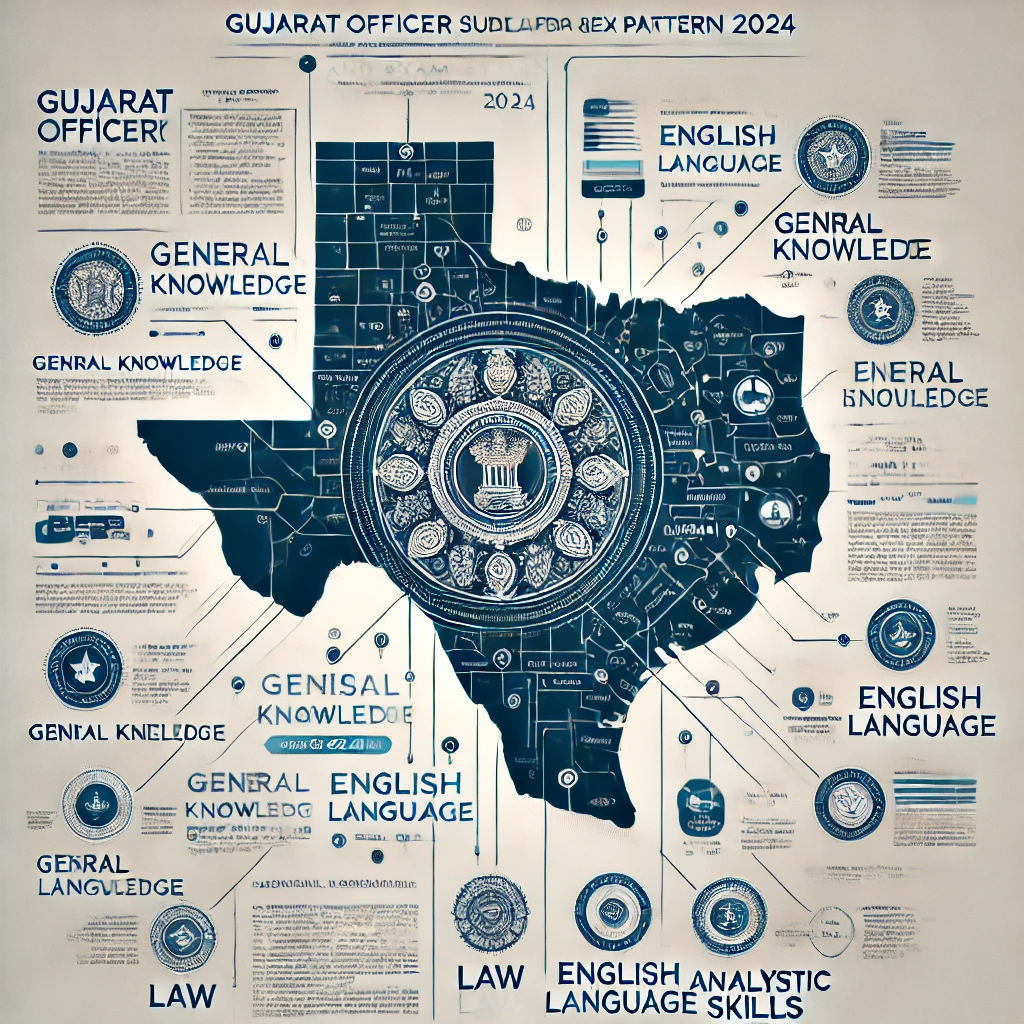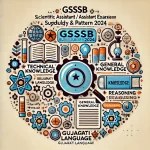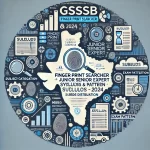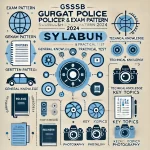The GSSSB will going to conduct computer based examination for the recruitment on 60 posts of Probation Officer to select eligible candidates for Gujarat’s social justice and empowerment department. This article explains the Gujarat probation officer syllabus along with detailed examination pattern necessary to prepare for its examination.

Contents
GSSSB Probation Officer Exam Pattern 2024
| Recruitment Conducted By | Gujarat Subordinate Service Selection Board / Gujarat Gaun Seva Pasandgi Mandal (GSSSB) |
| Name of Exam | Probation Oficer, Class – III |
| No of Vacancies | 60 |
| Category | Syllabus & Pattern |
| Notification Number | GSSSB/202425/227 |
| Salary | Rs 40800 (29200-92300 – Level 5) |
| Exam Type/ Selection | COMPUTER BASED RECRIUTMENT TEST (CBRT) |
| Official Website | https://gsssb.gujarat.gov.in |
Scheme of GSSSB PO Written Test:-
- Mode of Exam: Online-CBRT (computer based recruitment test)
- Type of Questions: Objective Type (Multiple Choice Questions)
- Maximum Marks: 210 marks (Part A: 60 Marks Part B: 150 Marks)
- Duration: 180 Minutes (3 hours)
- Language of Paper: Gujarati
- Minimum Qualification Marks: 40% in Part A & 40% in Part B.
GSSSB Probation Officer Subjects Covered in the Computer Based Test:-
- Logical Ability and Data Interpretation (30 Marks )
- Numerical Ability (30 Marks)
- Questions related to Constitution of India, Current Affairs, and Gujarati and English Comprehension. (30 Marks)
- Technical Knowledge/ Post Related Topics (120 Marks)
| Part A | Questions | Max Marks |
| Logical Ability and Data Interpretation | 30 | 30 |
| Numerical Ability | 30 | 30 |
| TOTAL | 60 | 60 |
| Part B | ||
| Questions related to Constitution of India, Current Affairs,
Gujarati and English Comprehension |
30 | 30 |
| Concerned Subject Related Topics | 120 | 120 |
| TOTAL | 150 | 150 |
| GRAND TOTAL | 210 | 210 |
| DURATION: 3 Hours (180 Minutes) |
Detailed GSSSB Probation Officer Syllabus 2024
The syllabus for the GSSSB probation officer 2024 exam is divided into two different parts. Understanding each part is important for good exam preparation.
Reasoning and Data Interpretation (30 Questions, 30 Marks):- This section evaluates logical thinking, pattern recognition, and problem-solving abilities.
- Problems on Ages
- Venn Diagram
- Visual reasoning
- Blood relation
- Arithmetic reasoning
- Data interpretation (charts, graphs, tables)
- Data sufficiency
Mathematical/ Numerical Ability (30 Questions, 30 Marks):- To assess candidate’s knowledge of numerical ability. The topics includes:-
- Number Systems
- Simplification and Algebra
- Arithmetic and Geometric Progression
- Average
- Percentage
- Profit-Loss
- Ratio and Proportion
- Partnership
- Time and Work
- Time, Speed and Distance
- Work, Wages and chain rule
Constitution of India (10 Questions, 10 Marks):-
- Preamble of the Constitution
- Fundamental rights
- Directive principles of state policy
- Fundamental Duty
- Power, role and responsibility of President, vice president and governor
- Parliamentary system
- Amendment of Indian constitution, emergency provisions in Indian constitution
- Centre – State Government and their relation
- Judicial System of Indian Constitution
- Constitutional body
Current Affairs (10 Questions, 10 Marks):- Current events of state, national and international importance
Comprehension (Gujarati {5 marks} & English {5 marks}) (10 Questions, 10 Marks):- To assess comprehension, interpretation and inference skills in both Gujarati and English. A paragraph given with set of question on the basis of paragraph Or statement and assertion type question can be asked.
Questions and its Applications related to Technical Qualification of Probation Officer (120 Questions, 120 Marks):-
Gujarat Probation Officer Concerned Subject Syllabus
- Definition and Scope of Social Work – Social Work Values and Ethics – Social Work Practice in India.
- Criminology: Meaning, Concept, scope and extent – Deviance – Definition, Concept andScope –Crime–Definition, Concept, Scope and Characteristics.
- Form of Crime; Crime in India – Patterns and trends – Punishment – Definition, Nature andTypes – Corporal and Capital – Prison as a community – Prison Programmes and reforms.
- Administrative functions: programmes and limitations of open prisons, Borstal schools, certified schools, reformatory schools, remand homes observation homes, juvenile Homes and special home.
- Criminal Justice system: Courts and Correctional administration – Probation and Parole Origin, nature, process and practice of Probation and Parole in India – role of Probation Officer in correctional setting.
- Introduction to Psychology: Concept and definition of psychology – Nature and Scope – Branches of psychology – Application of psychology to society and social problems.
- Methods in Psychology: Characteristics of psychological studies, Observation, Survey method, Clinical and case study method. Experimental method. Application of the method.
- Quantitative Analysis: Measures of central tendency and dispersion. Correlation. Levels of measurement. Reliability and validity. Application in test construction.
- Physiological Psychology: Structure of neuron, nerve impulses, synapse and neurotransmitters. Central and peripheral nervous system-structure and neural control of behavior. Hemispheric specialization. Endocrine system and hormonal control of behavior. Application of hemispheric knowledge to diagnostic purposes.
- Development of human behavior: Individual Differences; Heredity and environment;. Life span development. Role of early experience and mastering developmental tasks. Sensitive or critical periods of development in human life cycle and its application.
- Perception: Perceptual process. Perceptual organization. Perceptual of form, color, depth and time. Perceptual readiness and constancy. Role of motivation, social and cultural factors in Perception. Application of knowledge of Perception to skill development (e.g. for certain jobs like that of driving, airline pilots etc.)
- Learning: Classical conditioning and operant conditioning. Modeling and observational learning. Transfer of training. Learning and motivation. Application of the above to the improvement of academic performance in education.
- Memory: Physiological basis of memory. Memory and forgetting. Measurement of memory (Recall, Recognition, Relearning). Short term and long term memory. Theories of forgetting (Decay and interference theories and Repressive forgetting) Application of Mnemonic devices etc., to improving memory.
- Cognition and Language: Concept of formation. Nature and development of thinking. Language and thought and acquisition of language. Problem solving. Creative thinking and its applications.
- Intelligence and Aptitude: Definition and concept. Theories and models of Intelligence. Measurement of intelligence and aptitude. Exceptional intelligence. Mental retardation. Concepts of multiple, emotional and artificial intelligence and their applications.
- Motivation and Emotion: Definition and concept. of instinct, needs, drives and motives. Theories of motivation and their application (drive reduction theory, Maslow’s motivational hierarchy). Social motivation; Achievement, power, affiliation motives and influence of early experiences. Physiological basis of emotion. Theories of emotion) James-Lange and Cannon-Brad theories, cognitive physiological theory).
- Personality: Concepts and Definition of personality. Study of personality (Trait, type and eclectic approaches) Development of personality (Freud, Erikson, Biological and socio- cultural determinants). Measurement of Personality (Projective tests, pencil-paper tests). Application of personality profiles in fitting a person to a job.
- Adjustment and Stress: Concept and definition. Factors affecting adjustment (frustration and conflict). Sources of stress and reactions to stress. Coping with stress. Application of stress management techniques.
- Social Behaviour: Socio-cultural factors and behaviour. Development of attitudes, stereo- types and prejudice, Measurement of Attitudes (Thurstone, Likert attitude scale and Bogardus Social Distance scale). Strategies for reducing prejudice and changing attitude. Person perception, implicit personality theory and integrating impressions. Application of person perception to impression management.
- Application of Psychology: Health and mental health (yoga, meditation and relaxation therapies). Education (programmed learning; self instructional learning and learning styles). Community (self help through group cohesiveness and leadership). Industry (Assessment centre approach in selection, recruitment and training). Environment (man-nature interaction, personal space concept, pollution reduction information technology (Application to commercial, educational and health areas).
Important Links For Probation Officer Exam
- Must See: GSSSB Scientific Assistant/ Examiner Syllabus & Exam Pattern 2024
- For Latest GSSSB Updates:- https://4syllabus.in/tag/gsssb
- For Latest Government Jobs in Gujarat:- https://4syllabus.in/tag/gujarat/
- Official GSSSB Website:- https://gsssb.gujarat.gov.in
- For Official GSSSB Probation Officer Notification:- CLICK HERE
Note: Please note that is not an official Gujrart probation officer syllabus released by GSSSB. The probation officer syllabus provided here is taken from previous exam conducted for the same post and meant for study reference only so that applicants can start their exam preparations early. The syllabus will be updated once announced officially by GSSSB. Till then, Stay in touch with us.
Important FAQs
Is there negative marking in the GSSSB Probation Officer exam?
Yes, 0.25 marks for each wrong answer.
How can I prepare for the GSSSB Probation Officer exam?
Preparation should include studying the syllabus thoroughly, practicing previous years' question papers, taking mock tests, and staying updated on current affairs. Regular study and practice can help in covering all the topics effectively.
Will there be any changes in the syllabus or exam pattern for 2024?
Yes, this syllabus is for reference only. Official syllabus is yet to be released on the official GSSSB website.







